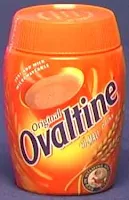The beauty of Bullshit Studies is that it applies not only to the hugely pretentious. For one thing, the Bullshit Detector would go into overload at something like the GOPer candidates debate. No, to be a comprehensive field of learning, Bullshit Studies must also go home.
Where I am calling bullshit on three products I've used for years, which have suddenly decided, without provocation or warning, to make themselves worse.
I've been pouring a small envelope of Emergen-C Super Orange into a glass of water every morning for decades. (In fact, if you go back even further, I virtually invented the name "Emergen-C" in a short story published in 1970 or so. Only it was the name of a spaceship. Actually it was Emergent-C, but that's even better!)
So here's the box--with its blue border and orange center, it was a delight to look for on my shelf--it was part of the experience. But now the bs Alacer company has gone and changed it to a bright ugly uniform sickish yellow orange box, and matching envelopes. Plus they've changed Super Orange itself! It's not even orange anymore. It's yellow. That's bullshit! Three hems worth on the BS Detector.
I've been drinking Stash tea since I got a sample of its organic brand sometime in the 90s. I added it to my regular breakfast (it's the next drink after Super Orange) at least a decade ago. I alternate the selections: one day English Breakfast, the next Earl Grey, then when they run out, maybe Irish Breakfast alternating with Chai Spice. They all came in these nice sized attractive boxes that lined up together, with the teabags accessible from a slot near the bottom. Perfect!
But why stop at perfection when you can fuck it up? That's just what Stash is apparently doing. The only boxes of English Breakfast I found recently were bigger, uglier and without that slot. The whole system is ruined. It's bullshit!
But just to make sure that breakfast is not my only meal of the day to be ruined, there's Ovaltine. I lost track of Ovaltine when Captain Midnight left the air, and Nestles Quick replaced it on the shelf (let's face it, Quick tasted better.) But several years ago, when I was pondering a selection of very expensive protein health drink mixes, I remembered Ovaltine. Okay, it may not have all those healthy ingredients, but it does have a lot--and malt alone is a significant boost. So I started up with Ovaltine again, first as an energy drink (with milk and some protein powder, banana for body, a few seconds in the blender.) I went as far as mixing and matching: the old basic Malt flavor, the Chocolate Malt ("chocolate-flavored Ovaltine" of my youth) and the new Rich Chocolate, which is maltless, but can be mixed with the malt flavor to taste. Eventually it became a nighttime hot chocolate as well.

I was pleased that the label and packaging hadn't changed much since Captain Midnight days. Then a few years ago, the brown glass container was replaced by brown plastic. Not great, but I got used to it. But now they're changing everything: the color (another bright yellowish monstrosity--the same color consultant as Emergen-C, apparently), the shape and the size. And to add injury to insult, they've got an "all new formula!" for the chocolate malt--and it's
terrible. Ovaltine was never that great tasting to begin with, so the margin for error was never very great. So now they've done this New Coke thing. Awful!
And bullshit! But it doesn't stop there. In the new Ovaltine jar, there's
no inner seal! Imagine! No inner seal to carefully tear out so you can enclose it with your quarter--I mean, how else are kids going to get their Captain Midnight Decoder Ring? Or their Captain Future Bullshit Detector?
I'm not giving in. I've kept a few blue Emergen-C boxes, and I empty the new envelopes into them so I don't have to look at that bullshit new package. I am bypassing the chocolate malt Ovaltine and mixing my own using classic Malt and Rich Chocolate. I don't have a fix for the Stash packages, except to try to reuse the old ones but that probably won't work for long. That's what makes it more than stupid, more than an inconvenience. It's bullshit.





















